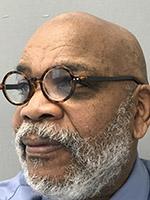Dr. Cross ’99M: A Role Model in the Classroom, and at Arcadia, for Black Students

“There are many students who have gone all the way through their matriculation and never encountered a Black male teacher,” said Education alumnus Dr. George Cross ’99M about returning to teach in the Woodbury school district after retiring a few years ago. “I felt like I was needed in the classroom.”
A Vietnam Navy veteran, Dr. Cross describes himself as “coming home battle scarred.” While he didn’t see combat, Dr. Cross says the time period was “the whole world being at war.” Most of his service was spent along the Mediterranean repairing and engaging with ships that had been damaged and watching for any Russian aggression. His battle scars are from returning home to a country divided and in upheaval about the Vietnam War.
Following his service, Dr. Cross enrolled at Temple University as a broadcast journalism major in 1970. With only 10 credits left, he was offered a job opportunity he couldn’t refuse: a radio announcer on Eazy 101 (now B101.1FM). A dream job, Dr. Cross stayed with the station for 10 years before returning to Temple and earning his degree in 1991.
As technology advanced, the need for announcers decreased. Dr. Cross recalled how announcers were once locals, but now radio stations use the same announcers for stations in different syndicates.
“They could be states away,” said Dr. Cross, who participated in the Feb. 17 Arcadia Round Table Talk: Arcadia’s Legacy of Black Excellence hosted by Arcadia Alumni Association, in collaboration with the Black Alumni Association of Arcadia University. “It led me to make my move out of radio, and I saw education open up. I still knew you needed a physical teacher, even if it was distance learning.”
“I got everything I needed at Arcadia,” said Dr. Cross, referring to how the faculty were experts in their fields and the staff was always willing to help if there was an issue. “I used to study at the Castle, I would find a nook and cranny to read. As a black male in the 90s, it wasn’t a common thing. Even today, you don’t see an overwhelming amount of us on campus, but even so, I had a support system on campus.”
Dr. Cross worked in Philadelphia and Camden school districts for 25 years until retiring in 2018. However, it wasn’t long before he wanted to get back into the classroom, and he joined Pathways Alternative School in Woodbury, N.J. as a part-time English teacher in November 2020. Pathways provides an alternative learning environment to Woodbury Junior-Senior High School for students who need smaller classroom sizes or different emotional and social opportunities to succeed.
“It’s very rewarding,” said Dr. Cross, who also holds a doctorate from the University of Phoenix in organizational leadership. “I want students to know their potential and their talent matters, and that they should invest in it. Sometimes we’re counting the wrong things because we’re forgetting about the things we can’t touch. Some of my favorite students didn’t get the best grades, but they had drive and passion. It didn’t fit in a box to check for their report card, but their passion, drive, and compassion drove them to success.”
As a member of the Black Alumni Association of Arcadia University, Dr. Cross will meet with Black students on campus to discuss careers paths and personal experiences. He wants adolescent and young Black men both at Arcadia and in the community to see him and know his journey, and he encourages all Black students to take hold of their education and be bold.
In his classroom, he gives Black students three pieces of advice: sit in the front of the classroom and be part of the action; ask questions, especially of those who come from other backgrounds to expand everyone’s cultural understanding; and study their own culture and history—honor the legacy of Reverend Dr. Martin Luther King, Jr. and Rosa Parks by exploring the many other great Black history makers and innovators. For Black History Month, Dr. Cross has taken this into action by requiring students to do projects on Black inventors, such as Patricia Era Bath, an African American opthamologist who created the laser cataract procedure, which has become the foundation for all laser eye surgeries today.
“All the money doesn’t matter—what matters is how I feel, the contributions that I’ve made, and the impact I’ve had,” said Dr. Cross. “It’s led me to a successful education career.”


